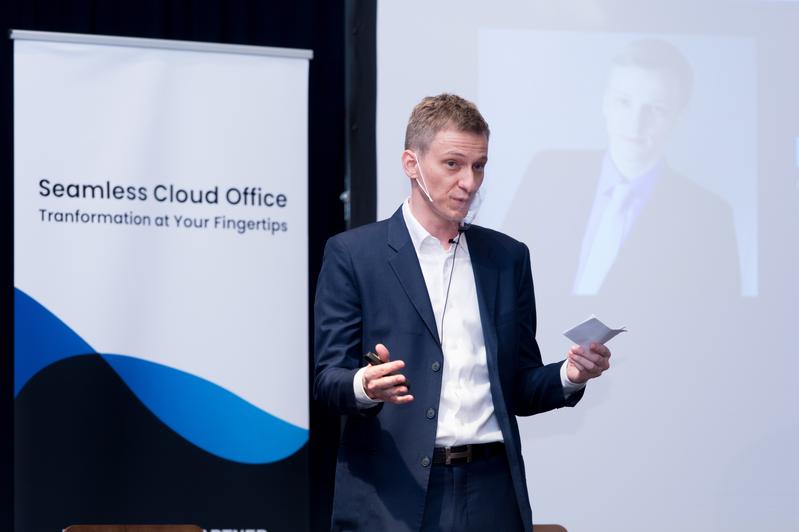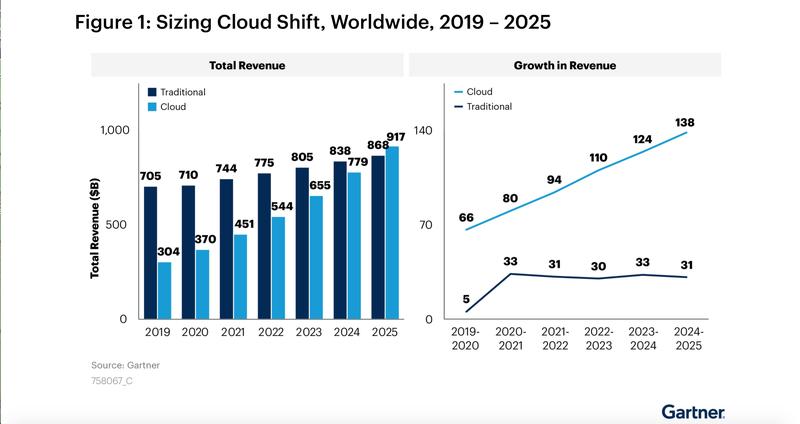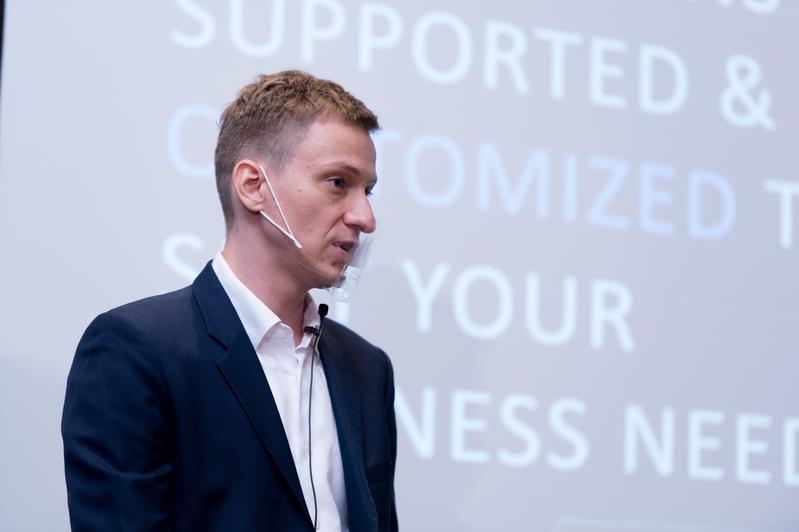 This undated file photo shows ITCS Group Founder and Group Chief Executive Officer Daniel Kolbe. (PHOTO PROVIDED TO CHINA DAILY)
This undated file photo shows ITCS Group Founder and Group Chief Executive Officer Daniel Kolbe. (PHOTO PROVIDED TO CHINA DAILY)
The transition to digitalization across the world has gone from a canter to a gallop in the past couple of years, when a new business and social dynamic emerged and the way we work fundamentally changed.
Users of desktop-as-a-service (DaaS) ballooned and further exponential growth is predicted. The coronavirus disease global public health crisis became a multiplier for corporate embrace of the cloud. Spending on cloud is estimated to be in the 12-figure range in 2022.
In the wake of this shift, information technology and service providers delivering cloud services are seeing growth opportunities.
A provider of information technology solutions to small businesses and global multinationals, ITCS Group is regarded as a disrupter that is continuing to deliver services for top tier banks, investment banks, and Fortune 500 companies among others, to speed up their digital transformation despite macroeconomic headwinds.
The group, which also nurtures technology talent, is poised to seize more opportunities through organic growth and mergers and acquisitions. The company sees its future in cloud solutions and software-as-a-service products. One of its leading products is AnyWare, its maiden, enterprise-IT-as-a-service product. This cloud office solution has been built to support enterprises large and small.
Global spending on cloud has soared. Private and public sector chief information officers are continuing to shift mission critical work to the cloud.
Another pain point that businesses face is the shortage of technology talent. Having started our journey in IT talent sourcing, we are establishing The Olympian Academy to train IT talents that would meet our clients’ needs. With the academy, when clients opt to use our solutions, they will not only have the technology but also the talents required to manage the latest cloud technology.
Daniel Kolbe, ITCS Group founder and group chief executive officer
Software-as-a-service has been estimated to be a more than US$120 billion global market. SaaS-based applications for example, allow for the scaling of coronavirus vaccine management.
By financial year 2023, ITCS Group is forecasting US$100 million gross revenue from its managed services portfolio alone.
Early February, the group secured a strategic investment from Dymon Asia Private Equity, the private equity arm of Singapore-based Dymon Asia Capital, an alternative investment management firm.
ITCS Group founder and group chief executive officer, Daniel Kolbe, explains how the company will achieve US$100 million in gross revenue by financial year 2023.
“The strategy is quite simple. Grow the managed services business organically at a 25 percent plus year-on-year growth rate and also through mergers and acquisitions with like-minded companies. We can then expand the footprint regionally and globally with a focus on North America to support key clients. The next step will be to roll out our AnyWare product globally through ITCS’s partnerships and also enable growth through our training academy,” Kolbe said.
“With managed solutions, our clients can immediately adjust and scale up their IT capabilities with just a few clicks. As cloud solutions are becoming the mainstream of IT services, technology should be used like a utility such as electricity, that it is just a switch away. That will feed the resource requirements of our clients as we will build a ‘best-in-class’ support and governance infrastructure for the group.
ALSO READ: Cloud infrastructure market sees rapid expansion
“Another pain point that businesses face is the shortage of technology talent. Having started our journey in IT talent sourcing, we are establishing The Olympian Academy to train IT talents that would meet our clients’ needs. With the academy, when clients opt to use our solutions, they will not only have the technology but also the talents required to manage the latest cloud technology.”
Kolbe has spent more than a decade in consulting on IT programs for investment banks in financial capitals, and is also experienced in leading change initiatives and developing IT outsourcing teams for clients.
“We have a clear business strategy focusing on managed services, AnyWare and our training academy. Changing from a single decision maker to a ‘team’ of decision makers has helped us progress quickly, as has exponential change within the sales and marketing functions. Launching an enterprise-IT-as-a-service (EaaS) model (AnyWare) and refocusing towards ‘verticals, that is, the products’ and ‘horizontals, for example, training and development,’ also helped the group to expand and grow,” Kolbe said.
 This undated graphic from Gartner shows the total revenue and growth in revenue of cloud and traditional technology. (PHOTO PROVIDED TO CHINA DAILY)
This undated graphic from Gartner shows the total revenue and growth in revenue of cloud and traditional technology. (PHOTO PROVIDED TO CHINA DAILY)
ITCS Group operates in Singapore, Hong Kong, the United States, Japan, Shenzhen, Australia, and India to enable companies to embark on the journey of digital transformation, Kolbe said.
“When we look at the trend of the market, it is clear that the future lies in cloud and SaaS products. Last year, Gartner forecast that infrastructure-as-a-service (IaaS) and desktop-as-a-service will record the highest growth in 2021, representing 38.5 percent and 67.7 percent, respectively. The surge in demand from the pandemic will remain, as companies are starting to realize that their current IT environment is unable to meet the business needs,” he said.
Virtual desktops have become a must-have now, shoving the old corporate virtual private networks without enough bandwidth and updates into the background. Remote working is a factor driving DaaS.
“Over the past two years, we have seen a large group of companies being caught unprepared by the pandemic initially, having then made tactical investments to cope, and many of those are mid- to long-term, now looking at strategic solutions and platforms, to gain full flexibility and productivity in a fast-moving market. As the world is getting ready for a post-pandemic business environment that requires more agility and flexibility, we expect that regardless of industries and sectors, enterprises need to have the IT infrastructure to meet the requirement of the new normal.”
Through the Olympian Training Academy, free technical and professional training programs are offered and trainees are then rewarded with competitive salaries and certifications from Amazon Web Services and Microsoft, Kolbe explained.
ALSO READ: Dell sees bright future for cloud sector
 This undated screengrab shows a picture of students of the Olympian Academy. (PHOTO PROVIDED TO CHINA DAILY)
This undated screengrab shows a picture of students of the Olympian Academy. (PHOTO PROVIDED TO CHINA DAILY)
As the world is getting ready for a post-pandemic business environment that requires more agility and flexibility, we expect that regardless of industries and sectors, enterprises need to have the IT infrastructure to meet the requirement of the new normal.
Daniel Kolbe, ITCS Group founder and group chief executive officer
“The academy aims to address the massive shortage of IT talents that has hindered the deployment of emerging technologies. Training talent to fill that void is our aim, which is why we are active now,” Kolbe said. “Trainees will not only obtain the technical and professional skills to succeed in today’s competitive environment, they will also receive the relevant accreditation that validates their expertise. In terms of career development, the academy will not only arrange placements for the trainees, it will also serve as a networking platform for alumni and trainees.”
There are three streams that trainees can choose from: desktop support engineer; support engineer/hybrid administrator; and DevOps (collaboration between development and operations team). Those seeking training can apply at https://itcs-group.com/solutions/the-olympian-academy/registration/
Kolbe notes that there is a “perceived dearth of tech talent in Asia Pacific”.
“This is one of the reasons that we set up the academy to train and bring forward top class technicians that can take up critical technology positions around the globe. The world is preparing for the post-pandemic world, and the flexibility and agility in IT environment will not only be here to stay, but will also be more important to meet unexpected changes in the world and the increasing expectations from the workforce to enable them to work whenever and wherever they need,” he said.
Citing the 2021 Tech Talent Expectations Survey by Randstad, a leading human resources solutions agency, Kolbe said the respondents ranked the following principal specialisms that are lacking tech talent: 53 percent cybersecurity; 51 percent artificial intelligence, automation and robotics; and 48 percent data science/analytics.
 This undated file photo shows ITCS Group Founder and Group Chief Executive Officer Daniel Kolbe. (PHOTO PROVIDED TO CHINA DAILY)
This undated file photo shows ITCS Group Founder and Group Chief Executive Officer Daniel Kolbe. (PHOTO PROVIDED TO CHINA DAILY)
Kolbe notes that being able to carry out fixed price projects and a capable team that takes ownership of projects are important competitive advantages of the ITCS Group.
“Our key attributes are: ownership of delivery; intellectual property that is replicable with multiple clients; and talent resources that are either in-house or outsourced and that can be pooled together to deliver a project. We excel at delivering solutions as committed at the agreed schedule and timeline, which is critical for our clients to maintain business continuity and sustainability,” Kolbe said.
Referring to technologies that are sought after, Kolbe points out that “everything is in demand”, depending on clients’ needs and wants.
READ MORE: IaaS success puts Chinese companies on cloud nine
“But there is a demonstrated demand for specialists on the latest technology, including support, software development, cloud architecture, DevOps and AI. Most recently, we launched the scalable all-in-one cloud solution AnyWare, to disrupt a stagnant and overpriced industry model. This saves money and reduces complexity, while also enhancing security and connectivity. It is solutions such as this that will take our group forward,” Kolbe said.
“Over the past two years, we have seen increased demand in remote work solutions, as companies are moving towards a more flexible work model between office and home. Other than the infrastructure, companies also need to think about how to ensure data security, as employees are working at different places with different devices and networks.”


